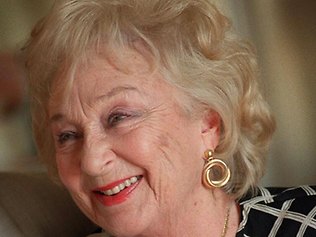Georgette Lizette "Googie" Withers CBE, 12 March 1917 – 15 July 2011 was an English theatre, film and television actress who was long a resident of Australia with her husband, the actor John McCallum, with whom she often appeared.
Biography
Withers was born in Karachi—then part of British India—to an English sailor and a Dutch mother. She was named "Googie" by her Sindhi nanny, a name she would go on to retain for the rest of her life. As a child, she learned Urdu and began acting at the age of twelve. A student at the Italia Conti Academy of Theatre Arts, she was a dancer in a West End production when she was offered work as a film extra in Michael Powell's The Girl in the Crowd (1935). She arrived on the set to find one of the major players in the production had been dismissed, and she was immediately asked to step into the role.
During the 1930s she was constantly in demand in lead roles in minor films and supporting roles in more prestigious productions. Her best known work of the period was as one of Margaret Lockwood's friends in Alfred Hitchcock's The Lady Vanishes (1938). Among her successes of the 1940s was the Powell and Pressburger film One of Our Aircraft Is Missing (1942), a topical World War II drama in which she played a resistance fighter who helps British airmen return to safety from behind enemy lines. She is well remembered for her role as the devious Helen Nosseross in Night and the City (1950), a classic film noir.
While filming The Loves of Joanna Godden (1947), she met her co-star, the Australian actor John McCallum, and they were married on 24 January the following year. They remained married until McCallum's death on 3 February 2010.
She first toured Australia in the stage play Simon and Laura. When McCallum was offered the position running J.C. Williamson Theatres, they moved to Australia. Withers starred in a number of stage plays, including Rattigan's The Deep Blue Sea, Desire of the Moth, The First 400 Years (with Keith Michell), Beekman Place (for which she also designed the set), The Kingfisher, Stardust, and Chekhov's The Cherry Orchard and Wilde's An Ideal Husband for the Melbourne Theatre Company; both productions toured Australia. They appeared together in the UK in The School for Scandal at the Duke of York's Theatre in Londons West End and on the subsequent British Council tour of Europe in 1983–4 and in W. Somerset Maugham's The Circle at the Chichester Festival Theatre.
Googie Withers starred on Broadway with Michael Redgrave in The Complaisant Lover and in London with Alec Guinness in Exit the King. During the 1970s, Withers appeared as prison governor Faye Boswell in the television series Within These Walls. (She was so well known from Within These Walls that she was asked to play the role of the Governor of the Wentworth Detention Centre in Prisoner, a job which she declined.)
In 2004, Withers came back into the news when a character on the ITV soap Coronation Street, Norris Cole, quipped that "Googie Withers would turn in her grave". Granada Television was forced to apologise a week later when they realised that she was very much alive.
In October 2007, aged 90 and 89 respectively, she and John McCallum appeared in an extended interview with Peter Thompson on ABC TV's Talking Heads program.
McCallum died in 2010. Googie Withers died on 15 July 2011 at her Sydney home, aged 94.
Honour
Withers was appointed a Commander of the Order of the British Empire (CBE) in 2002.
Family
Googie Withers and John McCallum were the parents of three children, actress Joanna McCallum, art director Nicholas and Amanda.
Filmography
Windfall (1935)
The Girl in the Crowd (1935)
The Love Test (1935)
All at Sea (1935)
Dark World (1935)
King of Hearts (1936)
Accused (1936)
Her Last Affaire (1936)
She Knew What She Wanted (1936)
Crown vs. Stevens (1936)
Crime Over London (1936)
Pearls Bring Tears (1937)
Action for Slander (1937)
Paradise for Two (1937)
If I Were Boss (1938)
You're the Doctor (1938)
Kate Plus Ten (1938)
The Lady Vanishes (1938)
Paid in Error (1938)
Strange Boarders (1938)
Convict 99 (1938)
The Gang's All Here (1939)
Murder in Soho (1939)
Dead Men are Dangerous (1939)
Trouble Brewing (1939)
She Couldn't Say No (1939)
Busman's Honeymoon (1940)
Bulldog Sees It Through (1940)
Jeannie (1941)
Back-Room Boy (1942)
One of Our Aircraft Is Missing (1942)
The Silver Fleet (1943)
On Approval (1944)
They Came to a City (1945)
Dead of Night (1945)
Pink String and Sealing Wax (1945)
The Loves of Joanna Godden (1947)
It Always Rains on Sunday (1947)
Miranda (1948)
Traveller's Joy (1949)
Once Upon a Dream (1949)
Night and the City (1950)
White Corridors (1951)
The Magic Box (1951)
Lady Godiva Rides Again (1951)
Derby Day (1952)
Devil on Horseback (1954)
Port of Escape (1956)
Nickel Queen (1971)
Within These Walls (TV series, 1974–1978)
Time After Time (1986)
Country Life (1994)
Shine (1996)







